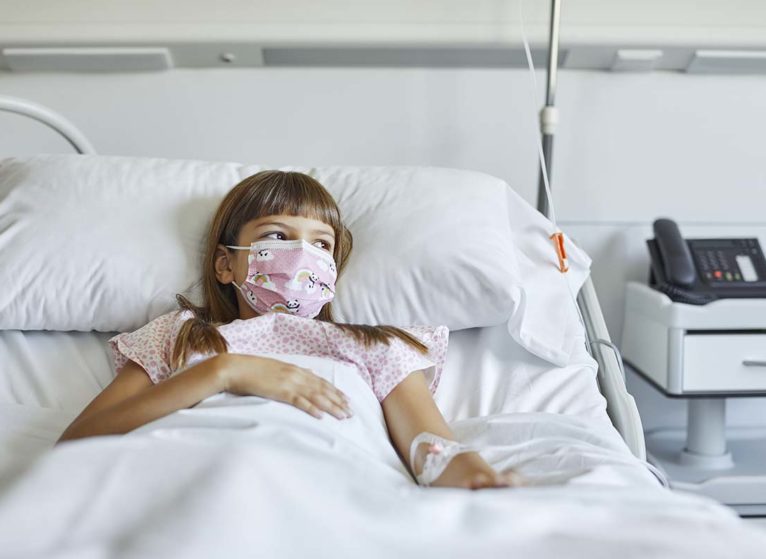
At least 180 cases of unexplained hepatitis in children are now under investigation, according to the most recent report from the Centers for Disease Control and Prevention. These cases date back to October 2021, and span 36 U.S. states, including Virginia. “We have not had any confirmed cases at UVA Children’s, but we do have cases under investigation,” says UVA Children’s pediatric hepatologist Frank DiPaola, MD. “However, it’s impossible to predict how this hepatitis outbreak in children will progress.”
The idea of unexplained hepatitis in children isn’t unique, adds Dr. DiPaola. Of kids with severe hepatitis who require transplant, around 30% of those are unexplained cases. What is unique — and what prompted the CDC to begin working with local health jurisdictions to investigate — is the cluster of 9 kids initially diagnosed in Alabama. Not only was this surge in pediatric cases above average, these kids also experienced more severe disease.
Unexplained Hepatitis Cases: By the Numbers
“Of the first 109 cases of unidentified pediatric hepatitis reported to the CDC, 90% have been hospitalized, 14% have required a liver transplant, and 5 have had a fatal outcome. Most of these kids were young and had no underlying health conditions,” says pediatric infectious disease specialist Debbie-Ann Shirley, MD, MPH. “The frequency of transplantation has fallen to about 9% with additional cases, but this still speaks to the severity of illness.”
“We have to keep in mind that only the sickest kids come to the hospital,” adds Dr. DiPaola. “There are cases that are not coming to clinical attention. So we’re not clear about the severity on a larger scale.”
Possible Adenovirus Link
Liver injury has many possible causes, including some medications and viruses. The cause of this current cluster of hepatitis cases in children is still unconfirmed, but there appears to be some link to adenovirus infections.
Of the first 109 cases being investigated, more than half of affected children also had evidence of adenovirus infection. Subtype 41 was identified in several cases, which is a known cause of gastrointestinal illness.
“When we talk about adenovirus, we’re talking about a large family of viruses that are very common; each will cause different symptoms, such as congestion, sore throat, conjunctivitis and fever,” says Dr. Shirley. “With adenovirus 41, kids are more likely to have diarrhea and vomiting. Unfortunately, there is no good and safe cure for adenovirus, but most kids will experience mild cases.”
Other causes, including SARS-COV2 coinfection, are also being explored. However, researchers haven’t discovered any link to COVID infection or vaccines.
Managing Adenovirus and Hepatitis Cases
As part of the its investigation, the CDC is asking healthcare providers nationwide to consider testing for adenovirus in pediatric patients of all ages with hepatitis of unknown origin. They are also requesting that doctors report possible cases, particularly in kids under age 10, to their local public health authorities.
Dr. DiPaola and Dr. Shirley offer these tips and reminders should you be presented with one of these cases:
- In addition to testing for typical causes of hepatitis, providers should also now test for adenovirus.
- You can test for adenovirus in a variety of ways using respiratory, blood, tissue, or stool samples. A pediatric infectious disease specialist can help guide the appropriate workup.
- The preferred method for adenovirus testing is PCR testing.
- Samples should be saved and submitted to public health authorities.
- In addition to doing routine bloodwork to determine if the liver is irritated, it’s important to also test for liver function.
- If the liver function test (INR) is elevated above normal range, this is a more urgent case and the patient needs to be evaluated by a hepatologist right away.
- The quicker hepatitis is identified and managed, the more likely the liver can recover.
How UVA Children's Can Help
UVA Children's specialists are on hand to assist you at any point during your patient’s care. “Don’t hesitate to contact us. We are happy to get calls and can often help resolve questions over the phone,” says Dr. DiPaola. “Most kids probably won’t need to see us right away. But if kids are sicker than usual, then you want them to be at a place with expertise. At UVA Children's, we can do a rapid and extensive workup right away and treat kids as soon as possible to help ensure they don’t develop severe complications of liver injury.”
Get a Second Opinion
Connect with a UVA Children's specialist quickly to get answers when you need them. Call 924-KIDS.